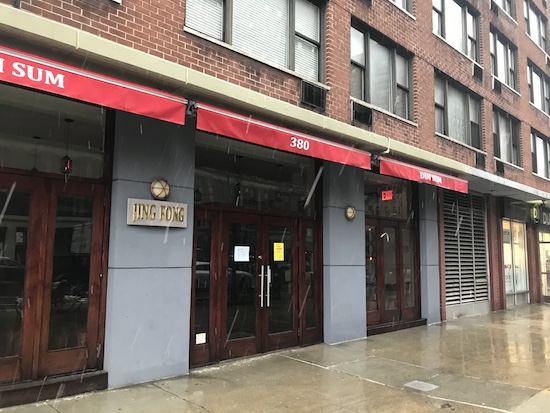
:no_upscale()/cdn.vox-cdn.com/uploads/chorus_asset/file/8865239/L1150457.jpg)
However, it would not be until 2012 that workers were finally allowed to collectively bargain a contract with the restaurant, making it the second restaurant in Chinatown, after Silver Palace, to become a union shop. “Through the Jin Fong struggle, we brought national attention to the issue of the sweatshop conditions in the restaurant industry.” “The struggle for justice and Jing Fong was sort of a landmark, watershed moment in the labor movement for Chinese American labor in general,” Mar explains.

“The boss and manager also misappropriated the workers’ tips.”Īlso Read: After Yang Song’s Death, Asian Sex Worker Advocates Call for Reduced PolicingĪfter a year-long battle with the Lam family, who have owned the restaurant since 1978, the New York State Attorney General’s office found the restaurant was in violation of labor law and forced the restaurant to pay $1.13 million in back wages in a historic settlement.


“Before the establishment of the labor union, I worked more than 60 hours a week, and I still couldn’t get the minimum wage and overtime wage,” he said. John Chen, who was one of the earliest to organize, recalls the miserable conditions he was forced to endure. “Our union was created because restaurant workers did not feel that the union movement at the time, back in the late 70’s-early ’80s, was really not interested in representing workers who were not white.”Īt Jing Fong, workers first attempted to organize against widespread wage theft in 1994. As Mar explains, the establishment of an independent union came as a response to the cold reception the workers received after reaching out to the established unions. If all of the workers are fired, the union will lose many dues paying members and will take a major financial hit.Īlso read: Chinese Students in the US Caught Up in Geopolitics and Trump’s Immigration Crackdown Workers and their supporters protest the impending closure of Chinatown’s Jing Fong restaurant’s dining room outside its landlord East Bank. At its peak, it represented 200 workers in Chinatown. The workers are fighting for their jobs but also to keep Chinatown’s only restaurant workers union alive.įirst established in 1980, after workers at the now-defunct Silver Palace restaurant organized against wage theft, 318 Restaurant Workers Union grew to become the only union representing Chinese restaurant workers. “This is not simply about a workplace, for many this a social institution in the community.” “During the good times the landlord made off like a bandit so this is the time that the landlord should do the right thing for the community and for the workers,” says Nelson Mar, president of 318 Restaurant Workers Union. Jing Fong’s second location on the Upper West Side will continue to operate as normal.Īccording to the union, Jing Fong’s lease with the Chus was unusual in that it required the restaurant not only to pay property taxes but also to share a portion of the restaurant’s profits with the landlord. In a statement shared with Documented, Truman Lam, Jing Fong’s current manager and operator stated that with the “drastic decline in sales and mounting losses sustained over the course of a year, we needed to make the tough call to close our indoor dining space and redirect our resources in hopes to continue our operations.” Documented was not able to reach the Chu family.Īlthough the dining room is slated to close, it will continue to operate the kitchen and provide customers with outdoor dining, takeout, and delivery options. Several of the new hotel developments in Chinatown are owned by the Chus and Jonathan Chu sits on the Board of Directors of the Museum of Chinese in America.Īccording to Jing Fong, during the pandemic, the restaurant’s sales drastically declined by 85 percent and the restaurant lost nearly $6 million. The Chu family, which owns East Bank, is one of the largest and most powerful families in Chinatown. Undeterred, workers and their supporters circled around the bank several times chanting “Save Jing Fong, Save Chinatown!” and “Shame on Alex Chu!“Īlso Read: Pearl River Mart Was Never Just a Store. Workers attempted to hand-deliver a letter stating their demands but were denied entry by bank employees with the assistance of the NYPD. On Tuesday, over one hundred people gathered outside East Bank on Canal and Centre Street, to demand Jing Fong’s landlord Alex Chu and his son Jonathan Chu keep the restaurant’s dining room open. Workers at Jing Fong are refusing to go down without a fight.


 0 kommentar(er)
0 kommentar(er)
